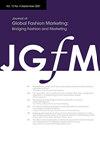感知奢侈品价值和使用可持续聚酯对品牌信任、感知质量风险和消费者品牌评价的影响
IF 5.5
Q2 BUSINESS
引用次数: 1
摘要
摘要:该研究考察了消费者的品牌评价时,可持续聚酯基于新的瓶子回收技术被用于时尚行业。此外,本研究评估了品牌优先感知的奢侈品价值及其对消费者基于这种可持续发展类型的品牌评价的影响。根据在日本收集的440个样本,结构方程模型显示,使用可持续聚酯增加了产品的感知质量风险。数据还显示,感知奢侈品牌价值与这种风险感知相辅相成,增加了品牌信任,从而影响消费者的品牌态度和购买意愿。此外,感知奢侈品价值对品牌信任和感知风险的影响即使在低奢侈品品牌中也存在。数据显示,通过在启动可持续项目之前建立/增强奢侈品牌属性,企业可能会在之后提高理想消费者基于品牌相关可持续发展的品牌评价。结果表明,奢侈品公司可以在可持续发展中发挥主导作用,因为他们的品牌属性抑制了消费者对这种新型工业产品的风险认知。同时,数据表明,虽然环境可持续性是社会期望的,但企业不能通过推出可持续产品来立即增加品牌信任。本文章由计算机程序翻译,如有差异,请以英文原文为准。
Effects of perceived luxury value and use of sustainable polyester on brand trust, perceived quality risk, and consumers’ brand evaluation
ABSTRACT The study examines consumers’ brand evaluation when a sustainable polyester based on new bottle recycling technology is used in the fashion sector. Additionally, the study assesses the luxury value priorly perceived from a brand and its effect on consumers’ brand evaluations based on this sustainable development type. According to 440 samples collected in Japan, structural equation modeling reveals that the use of sustainable polyester increases perceived quality risk toward a product. The data also show that perceived luxury brand value complementarily reduces this risk perception and increases brand trust, thereby contributing to consumers’ brand attitude and purchase intention. Additionally, these effects of perceived luxury value on brand trust and perceived risk are found even in the case of low-luxury brands. According to the data, by building/enhancing luxury brand attributes prior to launching sustainable projects, companies are likely to increase the desirable consumers’ brand evaluation based on brand-related sustainable development thereafter. The results imply that luxury firms can play a leading role in sustainable development because their brand attributes inhibit consumers’ risk perceptions of this new industrial product. Meanwhile, the data imply that companies cannot instantly increase brand trust through the launch of sustainable products, although environmental sustainability is socially desirable.
求助全文
通过发布文献求助,成功后即可免费获取论文全文。
去求助
来源期刊

Journal of Global Fashion Marketing
BUSINESS-
CiteScore
6.90
自引率
31.60%
发文量
34
期刊介绍:
The Journal of Global Fashion Marketing is a quarterly journal that publishes peer-reviewed conceptual and empirical papers and business cases of original works that significantly contribute to the overall advancement of marketing theory, research, and practice in fashion, design, and culture. JGFM endeavors to be a “global bridge” connecting marketing scholars and practitioners in fashion, design, and culture throughout the world. We publish high-quality scholarly articles on marketing written by contributors representing the leading academic authors. As we state on the cover of every issue, our positioning statement, our value added to the marketing scholar readership, is truly to “Bridge Fashion and Marketing” 1. Monitor and analyze global fashion marketing trends. 2. Generate and integrate new ideas and theories related to fashion, luxury, and culture marketing theory and practice. 3. Apply new research methods and techniques in fashion, luxury, and culture marketing. 4. Explore and disseminate cutting edge fashion marketing practices. JGFM welcomes manuscripts that provide fresh, innovative insight to any topic in the field of fashion, luxury, and culture marketing. Both conceptual and empirical works are valued, so long as the manuscript addresses substantive issues in marketing.
 求助内容:
求助内容: 应助结果提醒方式:
应助结果提醒方式:


